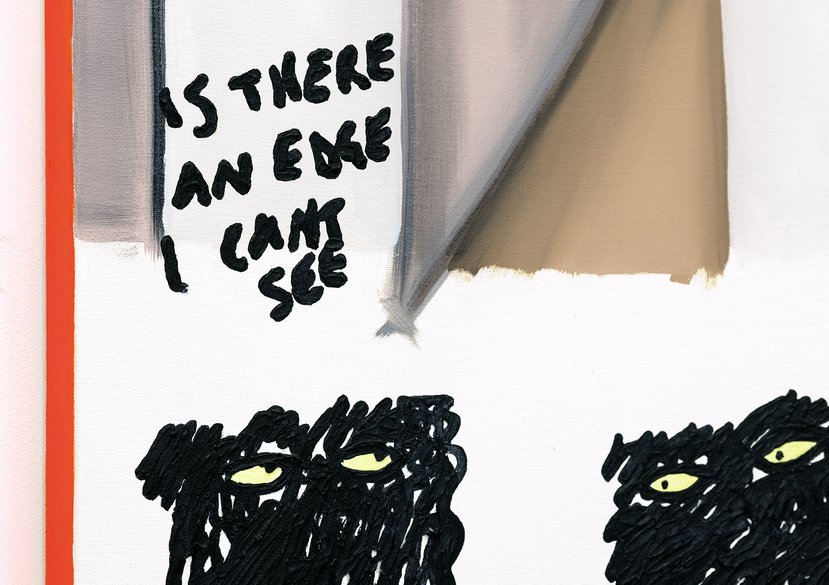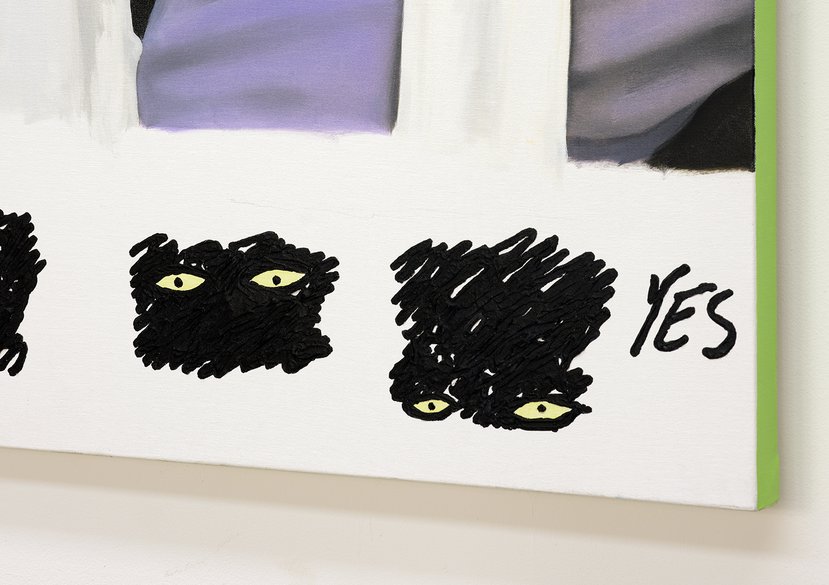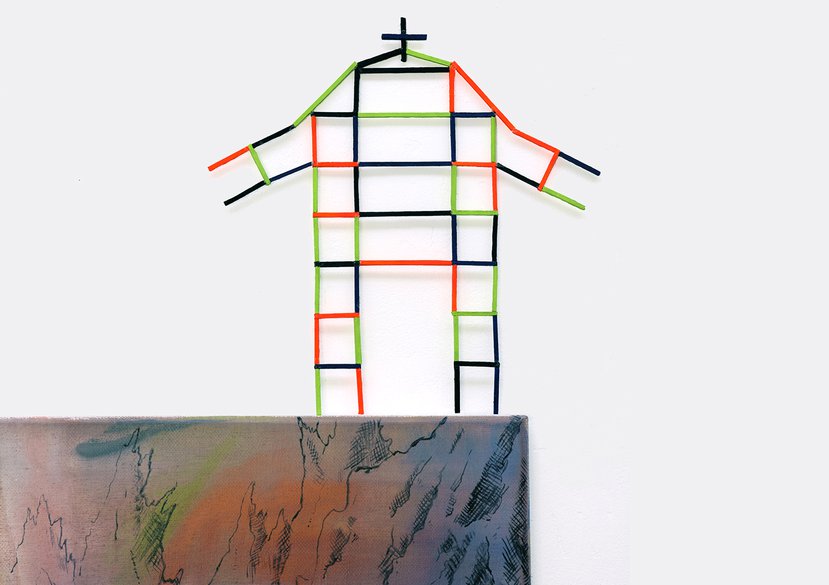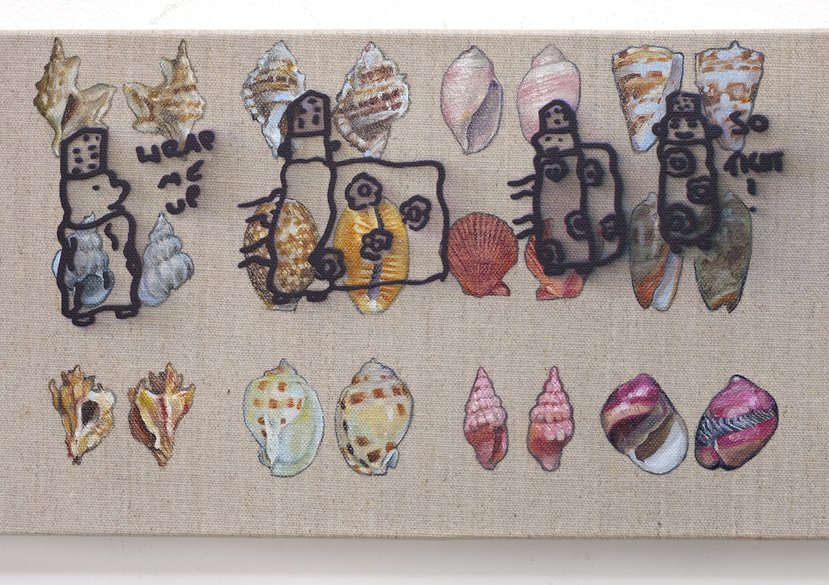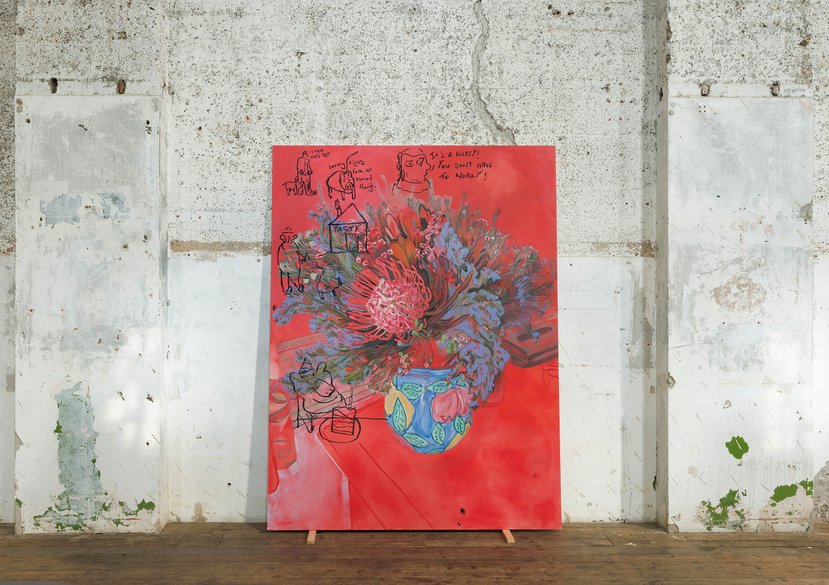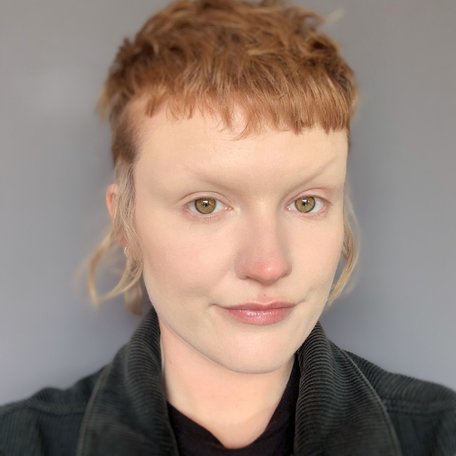
Painting the time of internet humour: Networked materialities
An artist and academic based in London, Emily's PhD research initially arose from a curiosity about the possibility of painting in the age of the internet.
Stemming from the proliferation of recent “post-internet” painting discourses, her thesis proposes a reconceptualisation of contemporary painting’s supposedly privileged relationship with networks and flows, whilst avoiding the metaphysical pitfalls which would (again) reduce practice to a kind of well-bounded art-object within a priori structures.
This practice-led research is therefore concerned with ways in which new forms of wildness and humour might emerge and cohere in a painting-internet encounter, outside of representational modes of thought, yet without giving up on the image altogether. Critically, this thesis turns towards Karen Barad and Johnny Golding for an alternative ontological approach, able to re-articulate the structure that supports sense as a local interference of continua (diffraction), in order to come to terms with how art practice matters.
Emily has taught BA and MA Fine Art at multiple UK institutions including Oxford Brookes University, Birmingham City University, Abingdon and Witney College Oxford, and The Royal College of Art.
Following a BA Fine Art (2014) and MA Queer Studies in Arts and Culture (2015) at Birmingham City University, she joined the RCA in 2018. She is an upcoming member of the Turps Studio Programme 2022/23.
Key details
School, Centre or Area
Area of expertise
Supervisors
Funding
Personal links
Gallery
More about Emily
Funding
(2021) LAHP Research Support Fund
(2020) LAHP Covid Extension Support Fund (6 months)
(2020) LAHP Research Support Fund
(2018) AHRC London Arts & Humanities Partnership Studentship
(2017) The Elizabeth Greenshields Foundation Grant
(2017) a-n International Travel Grant (Venice Biennale)
(2016) Frieze Artists’ and Curators’ Development Bursary, The New Art Gallery Walsall and New Art West Midlands
(2015) Arts, Design & Media PhD Classic Studentship, Birmingham City University
(2014) Gertrude Aston Bowater MA Bursary Bequest
Exhibitions
Solo Exhibitions
(2018) Emily Sparkes, Nordnorsk Kunstmuseum, Tromsø, Norway
(2017) sitcom laughing, Artefact, Birmingham, UK
(2016) Artist of the Day: selected by Sarah Taylor Silverwood, Flowers Gallery, Cork Street, London
(2015) Havill & Travis, Birmingham, UK
Selected Group Exhibitions
(2022)
Unruly Encounters, Southwark Park Galleries, London
(2021)
POST INTERNET, Abingdon & Whitney College, Oxford [online]
(2020)
2084, Dyson Gallery, Royal College of Art, London
(2019)
Yo, what’s the swing-scene like here? Kristian Evju and Emily Sparkes, Colour Index Agency, London
P L A Y, Stryx Gallery, Birmingham
Summer Camp, Eastside Projects, Birmingham
Showcase - Forward: New Art from Birmingham, Ikon, Birmingham
Forward: New Art from Birmingham, Medicine Bakery + Gallery, Birmingham
Staff Show, 29 January, Birmingham School of Art, Birmingham
(2018)
Women, Power, Protest, Birmingham Museum & Art Gallery, Birmingham
WIP, Stryx Gallery, Birmingham
RBSA Next Wave, Royal Birmingham Society of Artists, Birmingham
Gotcha ;) (Duncan Poulton, Ralph Pritchard, and Emily Sparkes), QUAD, Derby
Flight Mode, Assembly Point, Peckham
NN Open 2018, 13 January – 17 March, NN Contemporary, Northampton
(2017)
Coming Out: Sexuality, Gender and Identity, Birmingham Museum & Art Gallery
Little Monsters, Jubilee Trade Centre, Birmingham
Ruth Borchard Self-Portrait Prize, Kings Place, London
Publications
Book Chapters
Sparkes, E. (2020) 'The Floating Squiggle: Skeuomorphic Space and Post-Internet Painting', in C. Robinson, PhotographyDigitalPainting: Expanding Medium Interconnectivity in Contemporary Visual Art Practices (Newcastle Upon Tyne: Cambridge Scholars), pp. 145-166. ISBN-10: 1527555976.
Practice
Emily's work and research explores what painting is, or can be, in the age of the internet. Through painting, drawing, and installation she emphasises relationships to networks, be they historical, social, or cultural. In this way, painting never ceases to elaborate the conditions of its own making.
Her work has perhaps always been marked by humour including a somewhat irreverent embrace of multifarious sources and references. However, throughout her current PhD project, she has been wary to merely extend the aesthetic of the internet by reproducing the minutiae of the digital screen which would amount to a kind of limitation, what Mark Fisher would call the ‘slow cancellation of the future’ (Fisher, 2013).
Likewise, she is not interested in a preconceived idea of painting: rules or methods which would set up roadblocks for making or thinking. Rather, painting is anticipated as some kind of peculiar miracle, through which one might be thrown out of one's own habitual modes of thinking and feeling. It is often that case therefore that Emily's work makes use of a variety of materials and techniques determined by the painting at hand, questioning the stability of their cultural or material connections.
By paying careful attention to the work as it develops, it might also be possible to cast a comic lens on the slippages and overlaps between image, text, and understanding. In this sense, it’s not that one tries to make funny paintings per se, but tries only to allow for the poetic / fuzzy logics that might emerge auto-poetically, in the sense that painting has a life of its own.
